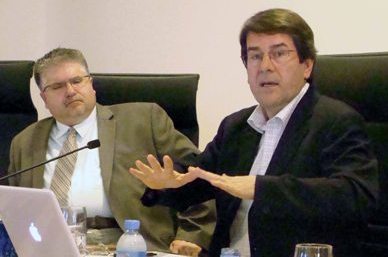American Studies, Dialogue Series, Regional Studies
A New Canadian-American Relationship

David Dyment, senior research associate at the Center on North American Politics and Society at Carleton University in Ottawa, gave a CIRS Focused Discussion on March 26, 2012, titled “A New Canadian-American Relationship. The lecture summarized the main arguments in his book, Doing the Continental: A New Canadian-American Relationship (Dundurn, 2010). Dyment explained that the title of his book harked back to a song and dance routine that was popular in the 1930s called “Doing the Continental.” This, he said, was an apt metaphor for Canada’s relationship with the United States as he viewed this as a “rehabilitation project” that requires both sides to dance in time with each other by learning the necessary steps to conduct a smooth and mature partnership. “Part of what this book is about is our dance with the United States […] and so the twelve steps of ‘Doing the Continental’ are both a ‘rehabilitation program’ for someone who is perhaps recovering from an addiction – the twelve steps to recovery – and also steps that would be involved in a dance,” he explained.
Dyment argued that Canada has to deal with two major issues on a daily basis: managing its internal differences between mainly French-speaking Quebec and the English-speaking rest of the country, as well as managing its relationship with its neighbor, the United States. Acknowledging the many different nationalities represented in the audience, Dyment gave a basic overview of why Canada’s relationship with the United States is so important, including the 5,000 km border that runs between the two countries, the strong influence of US culture and media on Canadian daily life, the long-standing energy and trade relations between the two countries, and the increase in joint Canadian-US intelligence and security efforts post 9/11.
With a population of 30 million in Canada compared to 300 million in the United States, there are real fears on the ground of Canada being subsumed under North America. This, he said, is a relationship that must be managed carefully. “To this day, when people think about how to engage the United States and Canada, they come at it from two perspectives […] the left nationalist perspective – these are parties who are not comfortable with the American political culture – and the right continentalist perspective that favors close political and trade relations with the United States,” he said. This highly polarized, ideological debate between the left and the right means that Canadians normally fall into one or other category. In the interests if conducting research for the book, however, Dyment said that he was able to debunk some of the popular political myths that are perpetuated daily on both sides of the ideological divide. “Through empirical social science,” he was able to clearly see the pros and cons of both perspectives as he tested the merits of the contending schools of thought. “I realized this was a great opportunity to see the relationship differently so that we wouldn’t further our contending national competing ideologies, but, rather, step back and ask how […] can we best advance Canada’s national interest?” he said.
Canada, Dyment explained, is “the largest exporter of energy to the United States by far – more than Saudi Arabia.” Instead of concentrating on some Canadians’ sense of vulnerability and fear of the US, it is important to recognize the many positive contributions towards the United States. The provision of 40% of the US imports of natural gas makes Canada more of a “moose” than a “mouse,” he said. “We are faced with a force of nature in North America with this huge American partner that we have to be wary of – which is what the left nationalists would say – but which we can also benefit from so long as we tame that force in our national interest.”
In conclusion, Dyment argued that for a new Canadian-American relationship to be forged, Canada must acknowledge its unique contribution as the basis for Canada’s engagement in the world. It is important to ask “What can we do that the Americans can’t do?” and offer a particular set of skills and comparative advantage. This will make Canada stronger internationally as well as give it more clout with the United States. Through this new appreciation of Canada’s value, “we can go into the world making a unique contribution and be more helpful and more influential with our American allies,” he said.
A past director of Canada’s Parliamentary Internship Program, David Dyment has served as a senior policy adviser in the Canadian Department of Foreign Affairs and International Trade, and on the immediate staff of the Governor General of Canada (the Queen’s vice-regal representative). As a commentator in the media, he has been published in Canada’s leading newspaper, The Globe and Mail and other publications, and heard on the Canadian Broadcasting Corporation, the BBC, and in French on Radio-Canada. He received his doctorate from the Université de Montréal.
Article by Suzi Mirgani, Manager and Editor of CIRS Publications